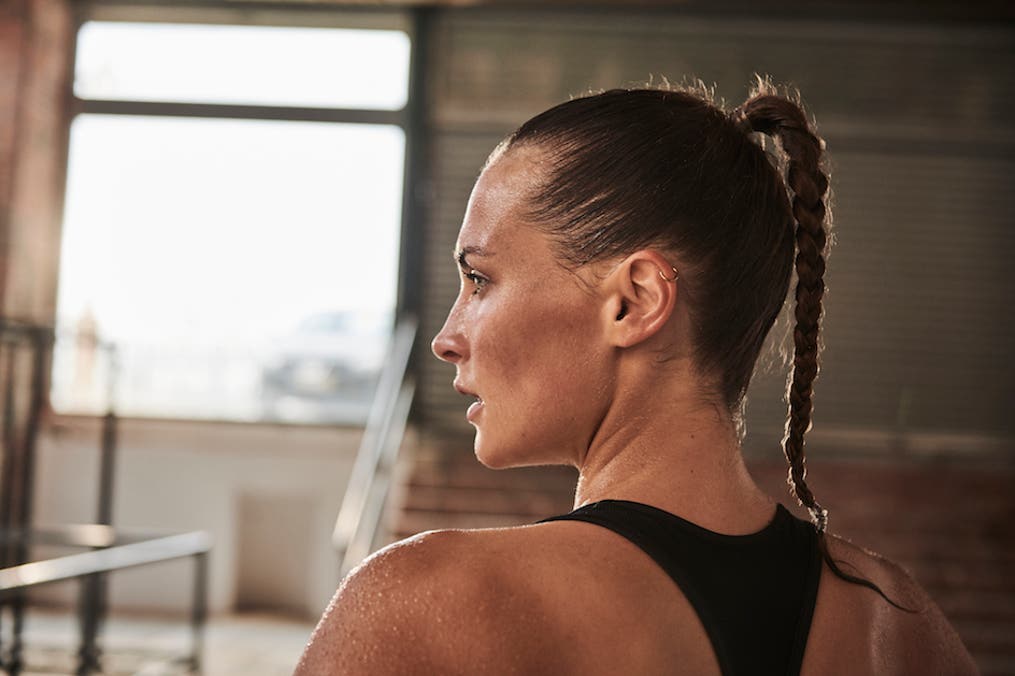Exercise and skincare have a complicated relationship, the nature of which differs from person to person. Concerned about whether you’re doing the right thing for your skin? Fear no longer, Freeletics Health Specialist Sarah Schunter has all you need to know.
Have you ever considered that there might be more you can do for your skin to stay fresh and healthy than applying toner, serum and moisturizer? Of course we all know that eating a colorful and balanced diet, rich in antioxidants, vitamins and fibre also has substantial benefits for our skin. But, aside from that, an active lifestyle and regular exercise can also have innumerable advantages for our skin. No one can deny that a good workout makes you both feel and look great, leaving you naturally flushed, glowy and full of endorphins. But how much does your skin really benefit from working out in the long term; does it work equally for everyone of us and for every kind of workout? What should we consider when thinking of skincare and workouts?
The basics
Exercise is beneficial in so many ways: it robustly alters the whole-body metabolism and protects you from age-associated physical deterioration and disease. Particularly well established are positive adaptations regarding metabolic tissues such as liver, skeletal muscle, or the cardiovascular system. And last but not least, exercise is also great for your skin. This is mainly due to the fact that the effort and heat generated increases blood circulation and oxygen supply to the skin, which is clearly visible in reddening of the skin during exercise. More oxygen and nutrients in the skin also mean improved cell growth, which is reflected in an increased renewal rate of the cells.
Good news: you will look younger with regular training! Furthermore, the increased blood circulation supports the removal of dead skin cells and free radicals. Recent research even suggests the presence of an exercise-induced novel regulator of mitochondrial function to be involved in the attenuation of skin aging.
Balanced workouts – healthy skin
The harder, the better?! If you love to push yourself to the limits make sure you also allow yourself some recovery. In fact, extreme and high-performance sports can have a detrimental effect on your skin in the long term. This is because your body will release stress hormones in reaction to heavy workouts that are performed on a regular basis. These stress hormones will not only weaken the immune system, but also lead to oxidative stress reactions and the constriction of blood vessels. As a result, oxygen and anti-aging substances like antioxidants will no longer be absorbed properly and the skin will look pale and dull.
Moderate endurance activities such as walking, jogging or cycling on the other hand are ideal. So the best thing for your skin would be to find a good balance between high intensity and moderate endurance workouts.
Considering skincare
Once you’ve worked out take your well-deserved shower and make sure to cleanse your body and face from sweat. Sweating is nothing to be afraid of. However, excessive sweating can make the skin break out, especially if the person is acne-prone. Use a gentle cleanser free from alcohol, fragrance and harsh surfactants. Once your skin is all fresh and shiny again, it’s the best time to apply skincare: the blood circulation is still increased from the previous workout putting your skin in a state where it is particularly receptive for treatments such as serums and moisturizer.
When exercising outdoors make sure to apply sunscreen – even during winter times! UV irradiation may cause permanent skin damage such as hyperpigmentation, wrinkles and skin cancer in the worst case. Therefore it is absolutely necessary to apply sun protection approx. 20 minutes before working out. Use a gel based sunscreen on damp skin this will make it easier to apply. Also make sure the product is waterproof so it does not enter the eyes when sweating.
Let's recap:
Contrary to the myths, not al exercise is bad for your skin. Providing you take certain precautions, regular training can actually be beneficial to your skin and even reduce the effects of ageing. But beware! Extreme and high performance sports can trigger stress hormones and have negative, but not damaging, effects.
